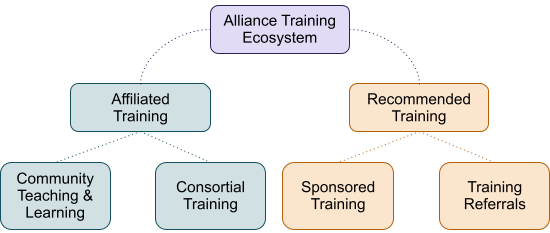The Alliance Training Ecosystem is a general framework to consider how training and professional development opportunities are developed, organized, and communicated. Some types of training or professional development directly align with specific categories, and others more loosely connect across multiple categories. This is a descriptive lens for considering training resources and materials, not a prescriptive way that training and professional development must be produced.
Framework
- Alliance Training Ecosystem
- Affiliated Training
- Community Teaching & Learning
- Consortial Training
- Recommended Training
- Sponsored Training
- Training Referrals
- Affiliated Training

Overview
Training and professional development opportunities for Alliance member staff fall within four main categories: Community Teaching & Learning, Consortial Training, Sponsored Training, and Training Referrals. These categories are intended to be guides; some training overlaps categories.
Definitions
- Affiliated Training includes types of training that are directly associated with the work of central staff, groups, and/or member staff. These categories have more active involvement from the Alliance community.
- Recommended Training includes types of training that are of community interest but often with less active involvement. Alliance-related activities tend to be limited to communications.
- Community Teaching & Learning is community-driven and focused on program-related topics. Often collaborative, support and coordination may be shared by central staff, groups, and/or member staff. While training often includes member representation, some may focus on opt-in or opt-out projects, which may limit member outcomes. Sessions are typically shorter, about 5 to 30 minutes.
- Consortial Training is community-driven and program-focused, often with cross-program topics. Frequently collaborative, support and coordination requires additional organization, which is shared by central staff, groups, and/or member staff. Designed for full participation across all member institutions, with space for one or more staff each. Sessions are typically longer, approximately 30 to 90 minutes.
- Sponsored Training is of community interest and provided by vendors for product demonstration, overview, or training. Central staff or groups communicate information via discussion lists, community calls, and more. Session lengths vary, but are often about one hour.
- Training Referrals are external trainings of community interest communicated by central staff or groups via discussion lists, community calls, and more. Session lengths vary, but are often about one hour.
- Training focuses on attaining skills or understanding concepts to accomplish specific tasks or apply to practices. Tends to be present-focused and more linear in response to “how” questions.
- Professional Development focuses on individual goals for improving knowledge, skills, and abilities related to professional growth. Often future-focused and more nonlinear in response to “why” questions. Member staff may consider training as a component of professional development.
